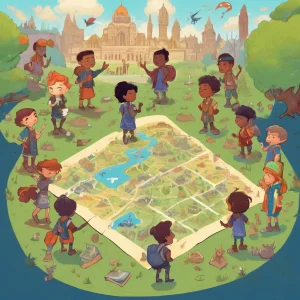Activity
Similar Activities
Nature-Inspired Drawing Activity
Children’s Age: 8–9 years
Activity Duration: 10 – 25 minutes
An outdoor activity where children draw natural elements to foster creativity and ecological awareness.
Activity Duration: 10 – 25 minutes
Ecosystem Adventure Board Game - Nature's Quest
Children’s Age: 7–9 years
Activity Duration: 10 – 25 minutes
An interactive board game where children explore and learn about ecosystems through challenges and tasks.
Activity Duration: 10 – 25 minutes
Nature's Objects: Exploring Buoyancy Adventure
Children’s Age: 6–7 years
Activity Duration: 10 minutes
An engaging hands-on activity for children aged 6-7 to explore buoyancy with natural objects.
Activity Duration: 10 minutes
Gratitude Journey: Writing Thank-You Notes Experiment
Children’s Age: 6–8 years
Activity Duration: 10 – 20 minutes
A creative activity for children aged 7-8 to write thank-you notes, enhancing cognitive and communication skills.
Activity Duration: 10 – 20 minutes
Cultural Creatures: Stop-Motion Animation Adventure
Children’s Age: 4–9 years
Activity Duration: 10 – 25 minutes
An interactive activity using technology to create stop-motion animations exploring plants and animals from diverse cultures.
Activity Duration: 10 – 25 minutes
Enchanted Discovery: Nature Scavenger Hunt with a Twist
Children’s Age: 7–8 years
Activity Duration: 10 minutes
An outdoor educational activity for children aged 7-8 involving a nature scavenger hunt with historical items, leading to a nature collage creation.
Activity Duration: 10 minutes
Shadow Hunt and Solar Exploration
Children’s Age: 5–6 years
Activity Duration: 10 – 30 minutes
An activity combining Physics, Space, and Ecological Awareness for children aged 5-6 to explore shadows and solar energy.
Activity Duration: 10 – 30 minutes
Nature Scavenger Hunt: Adventure in the Wild
Children’s Age: 4–9 years
Activity Duration: 10 minutes
An outdoor, nature-based activity promoting ecological awareness and cognitive development in children aged 4-9 years.
Activity Duration: 10 minutes
Musical Kindness Quilt
Children’s Age: 8–10 years
Activity Duration: 10 – 20 minutes
The "Musical Kindness Quilt" activity engages 9-year-old children in learning about famous musicians while enhancing communication skills and cognitive development. Children choo…
Activity Duration: 10 – 20 minutes
Cultural Collage Creations: Exploring World Wonders Together
Children’s Age: 7–9 years
Activity Duration: 10 – 25 minutes
Let's embark on a creative journey with "Cultural Collage Creations"! This educational craft project invites children to explore diverse cultures through art. Gather supplies and c…
Activity Duration: 10 – 25 minutes
The Global Treasure Hunt: Cultural Adventure Quest
Children’s Age: 9–11 years
Activity Duration: 10 – 30 minutes
Get ready for an exciting Global Treasure Hunt adventure! You'll explore different countries, solve clues, and work together in teams. All you need is a map, some clues, and a sens…
Activity Duration: 10 – 30 minutes
Space Collage Adventure: Crafting Cosmic Creativity Journey
Children’s Age: 3–8 years
Activity Duration: 10 – 20 minutes
Embark on a Space Collage Adventure where you can make cool space scenes using paper, scissors, and glue. Learn about space while creating your own unique collages with markers and…
Activity Duration: 10 – 20 minutes




























